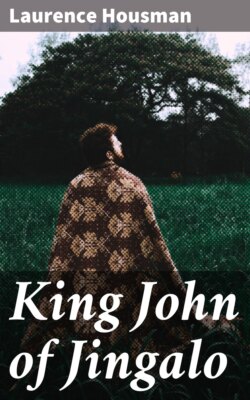Читать книгу King John of Jingalo - Laurence Housman - Страница 18
На сайте Литреса книга снята с продажи.
I
ОглавлениеTable of Contents
Bump! bump! bump! went his head. Through a confused vision of stars, veined marble, stained glass, and flying stair-rails he saw his legs trail helplessly after, close in above, fling violently across him feet foremost, and dash out of view. In other words, having reached the bottom of the grand staircase he had turned a complete and homely somersault.
For awhile he lay half stunned, unable to move. Something had undoubtedly happened to his head, but he was still conscious. Cautiously he turned himself over and looked round. No one was about; no one had seen this ignominious downfall of Jingalo's topmost symbol on the too highly polished floors of its own abode; and nobody must know. It was not the right and dignified way for a royal accident to happen: falling down-stairs suggested the same failing as that to which steeplejacks were prone.
He picked himself up, and aware now of a sharp pain in the middle of his spine as well as at the back of his head, crawled slowly and in a rather doubled-up attitude toward the royal apartments.
As he moved cautiously along the private corridor, he met the Queen coming from her room, dressed for going out. She detected at once his painful and decrepit attitude. "What is the matter, dear?" she inquired.
"Nothing, nothing," mumbled the King, "only a touch of sciatica." And as he did not encourage her impulse to pause and make further inquiries, she let him go past.
He went into his room, and sat very carefully down, for he was still uncertain whether some vertebral bit of him was not broken. Then he put his hand to the back of his head and felt it. Yes, undoubtedly something had happened; at contact with his finger it made a sound curiously like the ticking of a clock, and under the scalp a portion of bone seemed to move. And yet he was not threatened with unconsciousness; on the contrary he felt very wide awake: shaken though he was, ideas positively bubbled in his brain, his whole being effervesced. For a moment a fear flickered across his mind that he was going mad. But if so it was a wholly pleasurable sensation, for though his fancy went at a gallop, it was orderly, logical, and consecutive, not like madness at all. He dismissed the notion; but further reflection confirmed him in his determination not to tell anybody; he did not want to explain how he had walked upstairs fancying himself a steeplejack. It would have sounded stupid.
Then all at once he felt very sick and giddy, and going to the couch he lay down on it, and there, finding relief in the horizontal position, he fell fast asleep.
When he awoke an hour later his head, except for an extreme local tenderness, felt all right again; but when he tested it the faint ticking sound was still there. His mind was now calm; his thoughts no longer went at a gallop, but they seemed—what was the word?—freer, more articulate, more at his beck and call; and in spirit he was far less harassed and anxious. Altogether he felt that he possessed himself more than he had ever done before: his mental views had become more open.
Then he remembered that he wanted to see his son Max, and talk to him about certain matters; and so, after a few more tentative touches to the back of his head to find if it was still ticking—which it was—he went into his study, and sending for one of his secretaries, got a message despatched. And only when he was well on in the routine of his afternoon's labors did he recollect that he had not lunched.
That break in the regularity of his habits seemed almost an adventure; but as he did not now feel hungry he plodded on, for this was his day of the week for signing accumulated arrears of documents, and several hundreds awaited him. So for a couple of hours he worked as regularly and monotonously as a bank-clerk, and while he was signing the less important papers, and passing them to one of his secretaries to be blotted and sorted, another read out to him those of which he wished to learn the contents.
This duty was generally performed by the Comptroller-General himself; but to-day he was missing, and the King, left to make his own selection, was rather startled to find what a number of really important documents had been left over for this day, devoted to what may be described as routine signatures. As a rule it was the Comptroller who, out of his long experience, selected those documents which must be read and, only after due consideration, signed. Now, by some accident, he had been prevented from attending, and here was a crowd of important documents, the terms of which the King had never heard. He began to wonder. At least ten or a dozen were strange to him: he ordered them to be set aside. And now very dimly, very gradually, he began to suspect his position, and to perceive that without watchfulness he might very easily become less a conscious instrument of Government than a mere mechanism. What if he had become that already?
